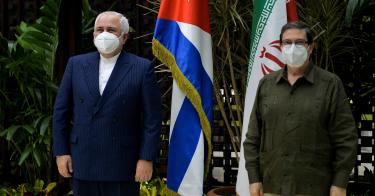After the October 7 terrorist attack on Israel, the Cuban Foreign Ministry issued a statement blaming the violence on the “impunity of Israel” and calling the Jewish state an occupying power. Missing was any condemnation of the Hamas terrorists. Perhaps, that’s because Havana has been providing intelligence to Hamas for decades and holding high level meetings with them, and their main sponsor, the Islamic Republic of Iran.
Cuba, of course, is on the list of State Sponsors of Terrorism (SST). But not everyone wants to keep that designation intact.
A number of Latin American politicians are calling on the Biden administration to remove Cuba from the list. And that has become a real possibility now that Sen. Bob Menendez, D-N.J., no longer chairs the Senate Foreign Relations Committee. A fierce critic of the Cuban regime, Menendez resigned the post following his Sept. 22 indictment on corruption charges. His replacement, Sen. Ben Cardin, D-Md., does not share Menendez’ antipathy toward the Cuban regime. Neither does Rep. Jim McGovern, who has called on Biden to remove Cuba from the SST list earlier this year.
The list of State Sponsors of Terrorism is a useful foreign policy tool for pressuring rogue regimes. It’s important to keep Cuba on the list. Let’s review how Cuba got there and why it should remain.
>>> Heritage Explains: Who’s Funding Hamas?
Cuba was initially designated as a state sponsor of terror on March 1, 1982, after the State Department confirmed Havana was using a narcotics ring to funnel arms and cash to the Colombian terrorist group M-19. Three years later, M-19 members stormed Colombia’s Palace of Justice, killing 11 of the Colombian Supreme Court’s 25 justices in one of the worst terrorist acts in the country’s history. (Among those asking Biden to drop Cuba from the list, is Colombian President Gustavo Petro, a former member of the M-19 terrorist group himself.)
In 2015, with Sen. Cardin serving as ranking minority member of the Senate Committee on Foreign Relations , President Obama removed Cuba from the list. But Havana’s behavior did not improve:
- In 2016, U.S. and Canadian diplomats in Cuba suffered brain damage from an unexplained illness known as the “Havana Syndrome.”
- In 2017, Cuban troops marched in a parade, presided by Raul Castro, chanting they would repeatedly shoot President Barack Obama in the head so many times they’d make a “hat out of bullets.”
- In 2020, Havana refused Colombia’s requests to extradite 10 leaders of the National Liberation Army (ELN), Colombia’s most active terrorist group, living in Cuba today. The ELN had “claimed responsibility for the January 2019 bombing of a Bogota police academy that killed 22 people and injured more than 87 others.”
For these reasons and more, the Trump administration placed Cuba back on the state sponsor of terrorism list in 2021. This pleased our democratic partners in the hemisphere who understand that Cuba has evolved from simply supporting Latin American terrorist networks to helping international terrorism, particularly from the Middle East.
Iran, the largest state sponsor of terrorism, has developed a close relationship with the regime in Cuba. When Iranian President Ebrahim Raisi visited Havana earlier this year, Cuban President Miguel Diaz-Canel observed, “This visit reinforced our conviction that we have in Iran a friendly nation in the Middle East, with which to confide… and talk about the most complex global issues.”
Following the Oct. 7 terrorist attack, Iranian Supreme Leader Ayatollah Khamenei welcomed Diaz-Canel to Tehran, stating that their strategic alliance “can take a common and effective position on important international issues such as the Palestinian issue.”
Iran has been building an asymmetric presence in Latin America and the Caribbean for several decades and counts on Cuba to strengthen its regional network. More than 20 years ago, Cuban dictator Fidel Castro visited Tehran and expressed the hope that “Iran and Cuba, in cooperation with each other, can bring America to its knees.”
Indeed, the Castro brothers have supported Middle Eastern terrorist groups since 1966, when they hosted the leaders of the Palestinian Liberation Organization. PLO Chairman Yasser Arafat subsequently visited Havana eight times. In the 1970s, it was common for Cuba’s Intelligence Directorate to send agents to PLO camps in Lebanon and vice versa. Between 1976 and 1982, the CIA estimated that 300 Palestinians were training in Cuban military camps.
>>> Biden Must Not Return to Obama-Era Cuba Policies
Today, Cuba’s presence remains strong in Lebanon, and the communist dictatorship has formalized its relationship with U.S.-designated terrorist groups, Hamas, and Hezbollah. In July 2021, Hezbollah’s head of international relations, Ammar Al-Moussawi, visited the Cuban embassy in Beirut to show solidarity during the height of anti-regime protests spreading throughout the island. Hezbollah and Cuba have both helped Venezuela’s Maduro regime and Syria’s Bashar al-Assad remain entrenched in power.
Removing Cuba’s designation as a terrorist sponsor would have multiple negative effects on U.S. national security. Chief among them is it would provide legitimacy to the longest-running dictatorship in the Western Hemisphere at a time when authoritarianism is on the rise in Latin America.
The Biden administration’s National Security Strategy, published last October, states that “the most pressing strategic challenge facing our vision is from powers that layer authoritarian governance with a revisionist foreign policy.”
You don’t fight against authoritarianism by rewarding an authoritarian regime. This is what happened in 2015, creating a moral hazard for U.S.-Cuba policy that established perverse incentives for the Cuban regime, instead of penalties for malign activities.
Counterterrorism is not a partisan issue. Maintaining pressure on the regimes in Havana, and Tehran, and enforcing sanctions on Hezbollah and Hamas are good policy decisions. Keeping Cuba on the U.S. state sponsor of terrorism list reflects the long track record of bad behavior of the Cuban regime. Turning a blind eye to this from 2015 to 2021 was bad policy, and it put Americans at risk. The U.S. Congress should ensure that the Biden administration does not make this mistake.
This piece originally appeared in RealClear Defense



